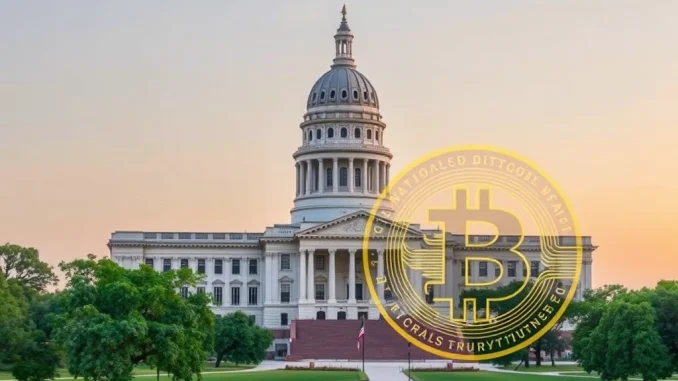
Texas is making headlines again, this time with a move set to significantly impact the cryptocurrency landscape. If you’re interested in how states are interacting with digital assets, this development is a must-watch. The Lone Star State has just taken a bold step towards embracing the future of finance by establishing a strategic Texas Bitcoin reserve.
What is SB 21 Texas and Why Does it Matter?
Texas Governor Greg Abbott officially signed Senate Bill 21 (SB 21) into law. This legislation isn’t just another bill; it marks a significant moment for government engagement with cryptocurrency. According to reports, SB 21 creates a framework for establishing a strategic Bitcoin reserve. The core idea is to potentially allow direct government investment in Bitcoin, setting Texas apart as a forward-thinking jurisdiction.
Why is this important? It signals a clear intent from a major US state to not only acknowledge but actively participate in the digital asset economy. This move aims to position Texas as a hub for technological innovation and a leader within the burgeoning cryptocurrency industry.
Understanding the Concept: A State Bitcoin Reserve
The idea of a State Bitcoin Reserve might sound complex, but the principle is relatively straightforward. Think of traditional government reserves, like strategic petroleum reserves or gold reserves, held for economic stability or future contingencies. A strategic Bitcoin reserve applies a similar concept to the leading digital asset.
Here’s a breakdown of what this could entail:
- Potential Investment: The bill creates a fund or mechanism allowing the state to potentially acquire and hold Bitcoin. This isn’t necessarily mandating immediate large-scale purchases but establishes the legal groundwork.
- Strategic Asset: Bitcoin is viewed by proponents as a potential store of value, a hedge against inflation, or a digital reserve asset. Holding it could be seen as diversifying state assets in a digital age.
- Innovation Signal: Establishing such a reserve sends a strong message to the tech and crypto industries that Texas is open for business and willing to explore new financial technologies.
Unlike individual or corporate Bitcoin investments, a state-level reserve involves public funds and carries different considerations regarding risk, security, and transparency.
Why Texas is Embracing Government Bitcoin
Texas already has significant ties to the crypto world, particularly in Bitcoin mining, thanks to its relatively low energy costs and pro-business stance. This existing infrastructure and industry presence provide a natural backdrop for further crypto adoption by the state government itself.
Key factors driving Texas’s interest include:
- Economic Development: Attracting crypto companies and talent by demonstrating state-level support.
- Innovation Leadership: Positioning Texas at the forefront of financial technology adoption among US states.
- Potential Asset Diversification: Exploring Bitcoin as a potential alternative or complementary asset class for state funds, although this is subject to significant debate and risk analysis.
This move under the new Texas Crypto Law framework builds upon previous efforts in the state to provide legal clarity and support for digital assets and blockchain technology.
Navigating the Path After SB 21 Texas
While the signing of SB 21 is a landmark event, it’s just the beginning. The bill establishes the framework, but the actual implementation of building a State Bitcoin Reserve involves numerous steps and considerations.
Future phases will likely involve:
- Defining the Fund: Establishing the specific structure, governance, and source of funds for the reserve.
- Acquisition Strategy: Determining how Bitcoin would be acquired (e.g., direct purchase, mining initiatives, donations).
- Security Measures: Implementing robust security protocols for storing and managing state-held Bitcoin.
- Risk Management: Developing strategies to address Bitcoin’s price volatility and other market risks.
- Regulatory Compliance: Navigating the complex and evolving federal and state regulatory landscape for digital assets.
This process will require careful planning and execution to ensure the reserve serves its intended strategic purpose while protecting public resources.
Considering the Implications of Government Bitcoin Holdings
The idea of a government holding Bitcoin sparks considerable discussion. Proponents highlight the potential for long-term value appreciation, inflation hedging, and attracting innovation. They see it as a forward-thinking approach to managing state assets in a rapidly changing global economy.
However, there are valid concerns:
- Volatility Risk: Bitcoin’s price can fluctuate dramatically, potentially exposing public funds to significant losses.
- Security Challenges: Governments holding large amounts of Bitcoin could become high-profile targets for cyberattacks.
- Political and Public Perception: Investing taxpayer money in a volatile, relatively new asset class could face political opposition and public skepticism.
- Regulatory Uncertainty: The future regulatory environment for cryptocurrencies at both the state and federal levels remains somewhat uncertain.
The success of the Texas Crypto Law regarding the Bitcoin reserve will depend heavily on how these challenges are addressed during the implementation phase.
Conclusion: Texas Takes a Monumental Step
The signing of SB 21 marks a pivotal moment, not just for Texas, but for the broader conversation around government adoption of digital assets. By establishing the legal foundation for a strategic Texas Bitcoin reserve, the state is signaling its ambition to be a leader in the future economy. While the path forward involves careful planning and navigating potential challenges, this move solidifies Texas’s position at the forefront of crypto innovation in the United States. It’s a development that bears close watching as other states consider their own strategies regarding digital assets and blockchain technology.



